Other
Abrams Books: Picture Day Perfection: A Common Core State Standards Aligned
This activity and discussion guide uses the book "Picture Day Perfect" to teach multiple common core state standards for language arts. Included in this lesson are discussion questions, a craft project, printable worksheets, and an...
Better Lesson
Better Lesson: Identifying the Difference Between Informational and Literary Text
Students will learn the difference between books that tell stories and books that give information. Multiple videos of different level reading groups engaged in this lesson, along with a printable activity sheet are included.
Better Lesson
Better Lesson: Learning About Subheadings and Bold Words
In this lesson, students will use several strategies to learn the meaning of new words they encounter in text. The students will learn specific strategies so when they encounter new words, they can figure out the meaning of those words...
Better Lesson
Better Lesson: Comparing and Contrasting With "Then and Now"
This instructional activity is a great small group reading instructional activity that has a social studies connection. In this instructional activity, learners will be comparing and contrasting schools from long ago and schools of today...
EL Education
El Education: Learning to Read Informational Texts: Building Background
In this comprehensive unit, students launch their learning about birds by using informational texts. As students read these texts, they build background knowledge and develop their skills as readers of informational texts. Included are...
Better Lesson
Better Lesson: Where Did You Learn That?
As adults, we explore pictures, captions, diagrams and text, when reading any kind of informational piece. Kids can do this too! In this instructional activity, learners will sort information that was obtained from pictures and diagrams,...
Better Lesson
Better Lesson: Many Parts
Preparation for reading complex informational texts starts in K and First grade. Knowing the features of the genre, and how to navigate through it is one of the necessary stepping stones. This instructional activity introduces the...
CPALMS
Cpalms: What Do You Do With a Tail Like This?
[Free Registration/Login Required] In this instructional activity, students will use What Do You Do With A Tail Like This? by Steve Jenkins and Robin Page to identify the main topic and key details using the illustrations and text....
Better Lesson
Better Lesson: Text Feature Diagrams
At the end of this instructional activity, students will be able to identify and create diagrams associated with informational text. Included is a link to an eSpark video on diagrams, rules for group work, multiple examples of diagrams,...
Better Lesson
Better Lesson: Visual Representations in Informational Text
Students will look at examples of illustrations and diagrams in informational texts and discuss how each one helps enhance the text. Students gain the knowledge that sometimes a picture is worth a thousand words because a complex idea...
Better Lesson
Better Lesson: What Shapes the Land?
In this lesson plan, the teacher will read a book about different landforms. The children will learn about the features of the landforms and how they were shaped by natural forces. Then text features will be discussed. The children will...
Better Lesson
Better Lesson: Who's at the Door? Use Images to Find Out!
Young scholars will use words acquired through reading to describe images (with adjectives) that demonstrate an understanding of characters in a story. The teacher will read Miss Nelson is Back which has great descriptors and will hold a...
Other
Smekens Educational Solutions: Expose K 2 Readers to Annotation Strategies
This article discusses how to begin teaching students in K-2 to record their ideas about text using highlighters, colored pens, large graphic organizers, and sticky notes. Students can retell a story with a storyboard, use a web to find...
Auburn University
Auburn University: How Children Learn to Read Words
How do children really learn to read words? This resource offers insight into this complicated but exciting journey of putting sounds and words together to learn the joy of reading. Come and discover more.
Writing Fix
Writing Fix: If You Give a Student an Animal
For this lesson plan, the book If You Give a Moose a Muffin, written by Laura Numeroff, is used as a mentor text for word choice. The content focus of the lesson is to teach the students to take ownership of scientific and descriptive...
E Reading Worksheets
E Reading Worksheets: Setting Worksheets
In this learning module, students will study the concept of setting in literary text. Worksheets and PowerPoint lessons are provided to help students practice with finding "settings" and then citing reasons that support their answers.
Writing Fix
Writing Fix: The Wacky "I Will Not" Chalkboard
Students can use this writing idea from the book Wacky We-Search Reports by Barry Lane to demonstrate understanding in any content area. Students use the idea of writing "I will not " sentences to show their knowledge of various...
Curated OER
Mc Graw Hill: Part 1: Reading Literature
Learn how asking and answering questions can help readers understand literature better. Site includes a model and an example of how to use this system.
Curated OER
Mc Graw Hill: Part 1: Reading Literature: Use Illustrations and Details
Learn how drawing characters, settings, and events can help with reading comprehension.
Other
Audiblox: Foundational Reading Skills
What types of reading skills do students need to be successful? This informative site focuses on students with learning disabilities. Explore!
Other
Laus Dnet: Grade 1 Word Lesson Plan (Stone Soup) Pdf
In this lesson plan, students use Stone Soup by Ann McGovern to generate word lists and use patterned text to assist with descriptive writing. Gives links to step sheets and samples for creating a table , a template for shared writing, a...
Florida Center for Reading Research
Florida Center for Reading Research: Expository Fact Strip [Pdf]
A lesson plan in which students read a text and identify the topic and four facts presented within the text. Materials are included.
Quia
Quia: Literary Terms Quiz
In this self-scoring practice activity, students read four passages and select the main idea of each.
Houghton Mifflin Harcourt
Harcourt: School Publishers: Test Tutor: Sequence
Students will increase their reading comprehension skills and understanding of story sequence by reading a passage of text and then answering questions about the order of events.



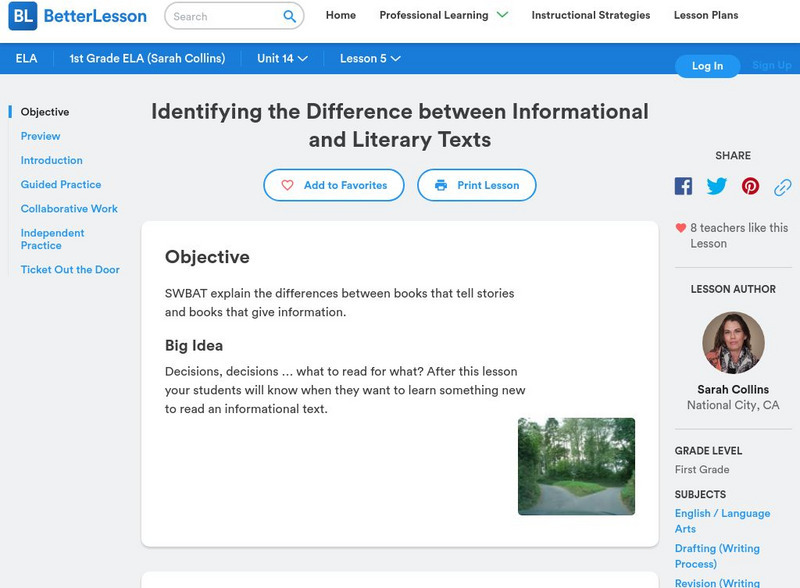
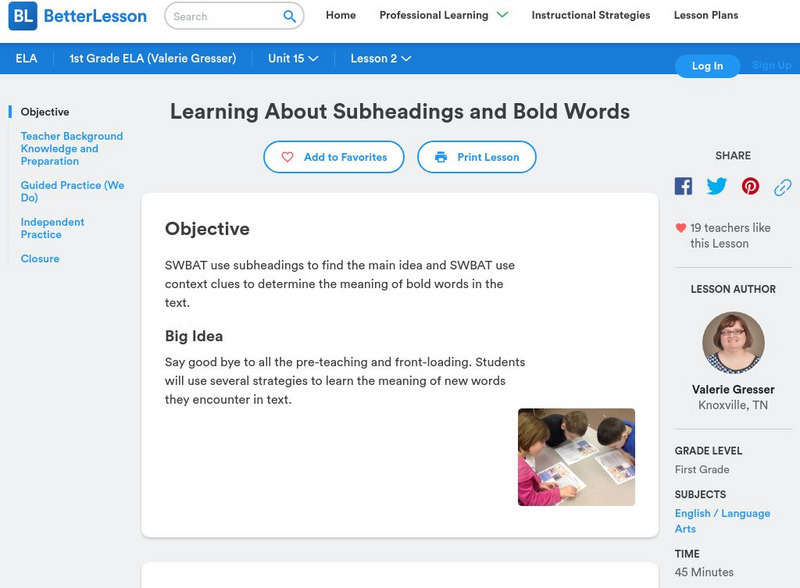

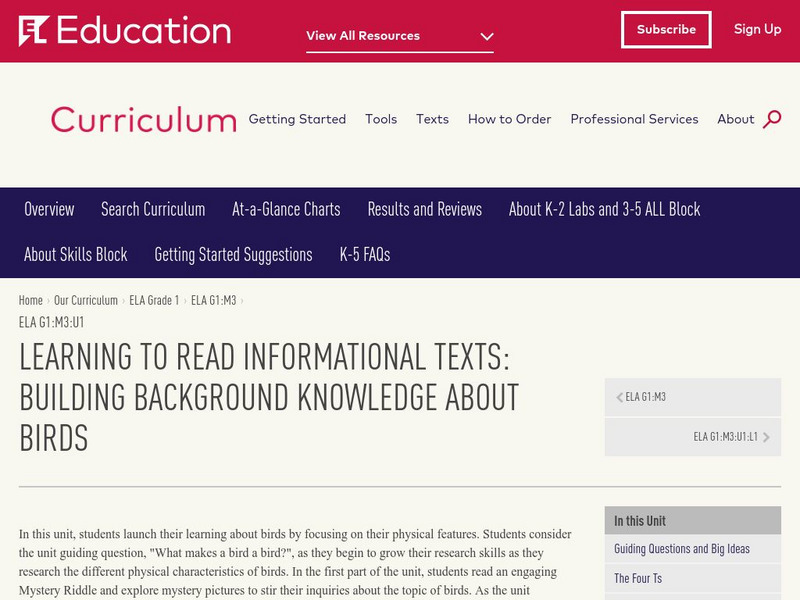

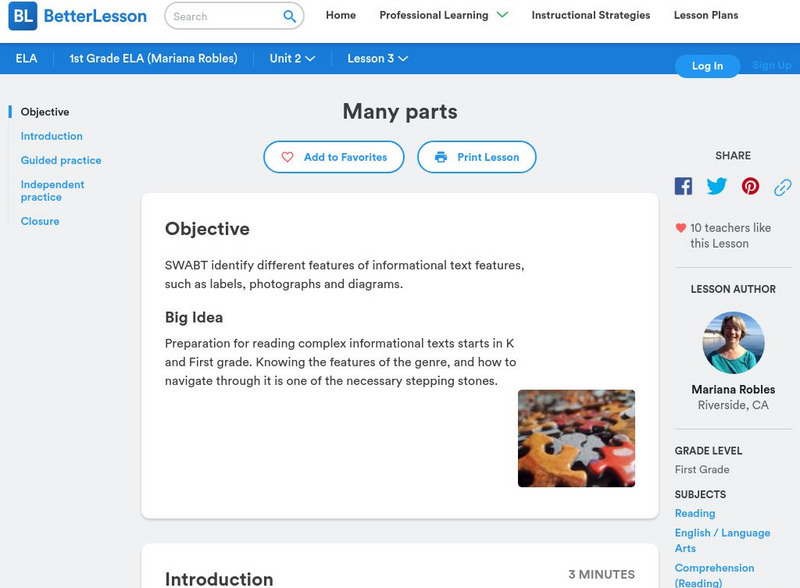

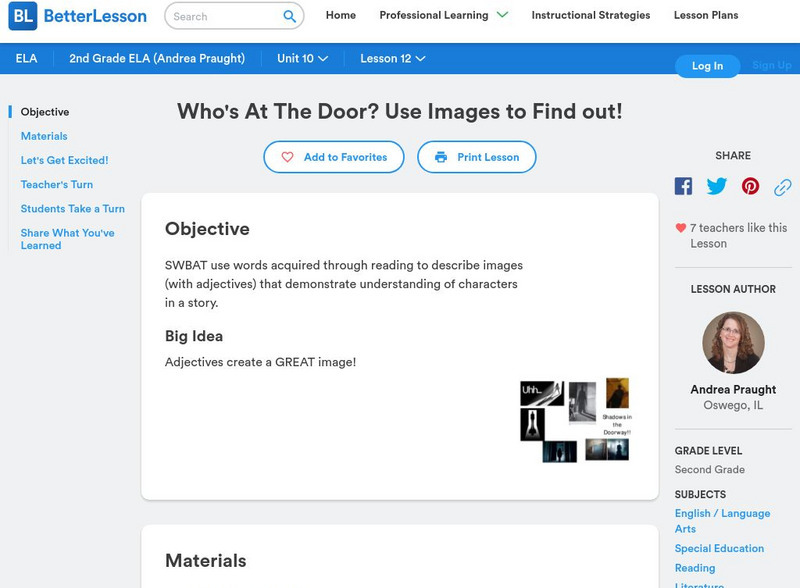
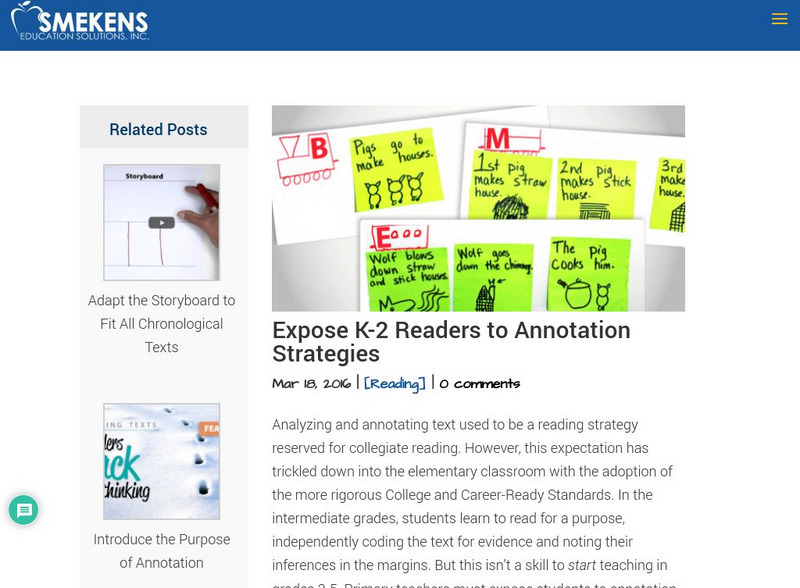
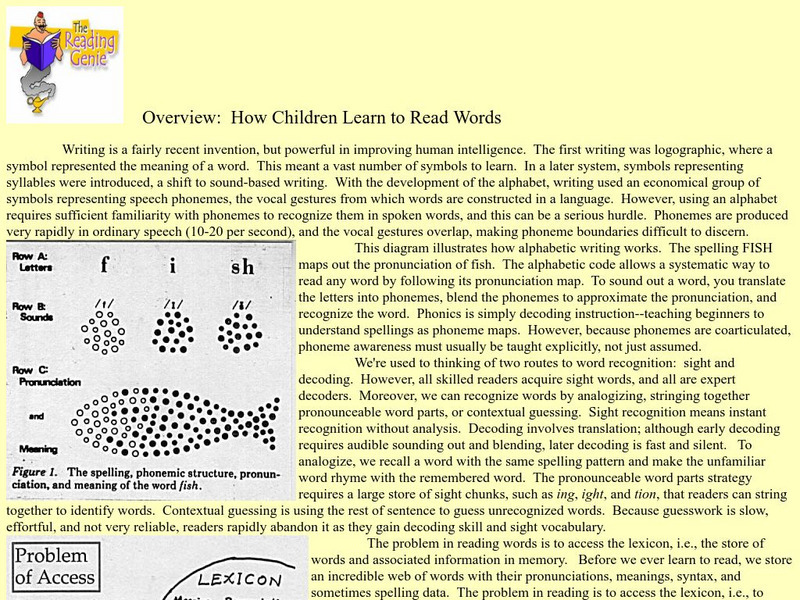


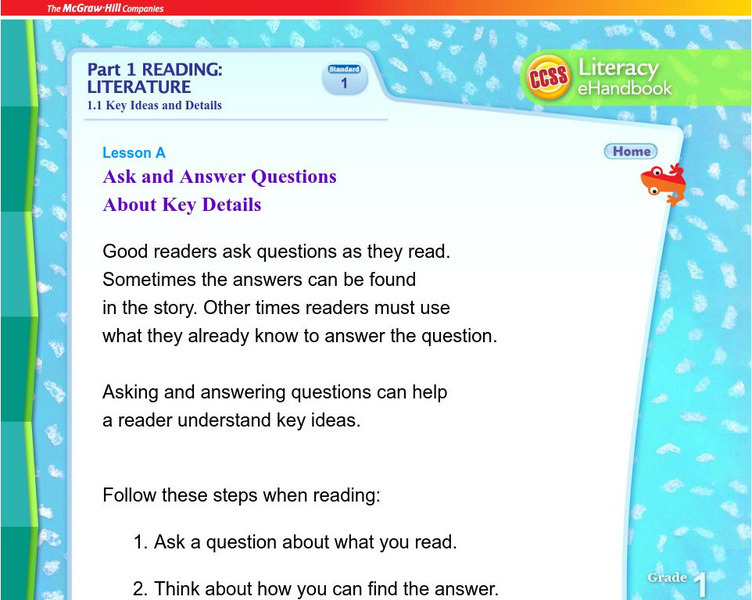



![Florida Center for Reading Research: Expository Fact Strip [Pdf] Lesson Plan Florida Center for Reading Research: Expository Fact Strip [Pdf] Lesson Plan](https://content.lessonplanet.com/knovation/original/101726-6e9433c83ac2e2bbad9c1c7411098251.jpg?1661786954)

